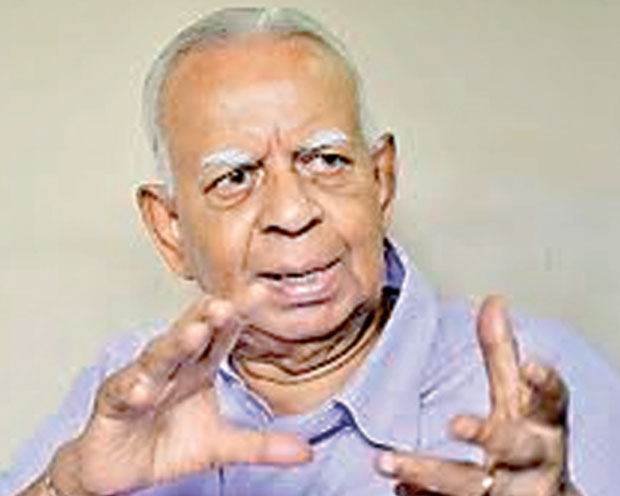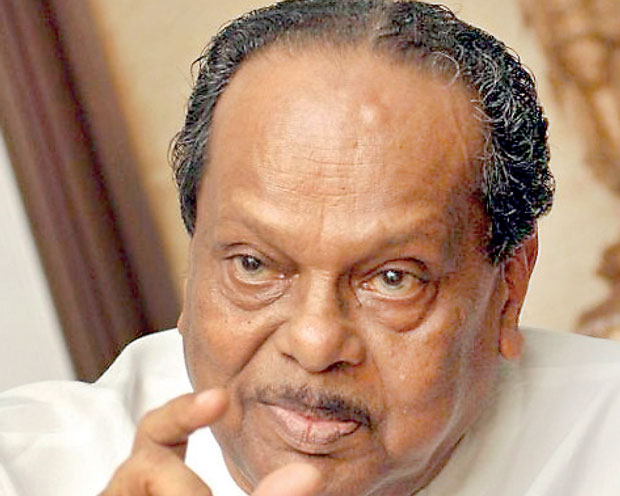Reply To:
Name - Reply Comment
Last Updated : 2024-04-20 00:00:00
Two veteran politicians in Sri Lanka that I respect very much are both senior Tamil politicians.
Both have been in active politics for well over 60 years for now. Veerasingham Anandasangaree is one. A school teacher, he taught at KotelawalapuraVidyalaya, Ratmalana too. He later took to law in mid 1960s. He started his political career with the LSSP in 1955.

Sangaree contested Colombo North Municipal Ward against V.A. Sugathdasa of the UNP in 1959. In March 1960 elections he contested Kilinochchi from the LSSP. “Sangaree” is in active politics for the past 62 years for now.
The other favourite politician of my choice is Rajavarothayam Sampanthan from Trincomalee. Sampanthan had been a student of St. Sebastian’s College, Moratuwa too.
He practised as an Attorney at Trincomalee Courts. His political ideologue was “Thanthai” Chelva (S.J.V.) and became a member of Ilankai Tamil Aarasu Katchi (ITAK-the Federal Party) in 1957.
Though he declined to contest Parliamentary Elections in 1965 and 1970, he was one of the youngest activists arrested and remanded for over three months at the Panagoda Army Camp in 1962, for participating in FP’s very successful “civil disobedience” campaign. His political career spans over 60 years for now.
Between them, there are plenty of common grounds though they now tread two different paths.
First and most importantly, they lived through the most democratic phase of Tamil politics till armed youth groups took over late in the decade of 70. Thereafter they survived the next phase, when the LTTE ruthlessly dictated terms within Tamil politics.

Sangaree paid a high price during this second phase. Two of his brothers were killed during the IPKF operations, two sons of one of his brothers went missing abducted by the LTTE and then another nephew was wiped off by the LTTE in Chennai along with EPRLF cadres.
Sampanthan too had a difficult time after Amirthalingam, Yogeswaran and others were killed by the LTTE in Colombo and for a period of time lived in Chennai.
They both survived the second phase of Tamil nationalism under LTTE brutality.
In the present third phase that began after the war was savagely brought to an end, Sampanthan is the Tamil leader with Sangaree left in the side lines in democratic Tamil politics.
Difference between them is political and not personal.
Sangaree never compromised his position on the LTTE. He refused to accept the LTTE as the sole representative of the Tamil people. That made him a “traitor” in a Tamil world where Prabhakaran was “the saviour” of Tamil people.
Sangaree was therefore compelled to seek refuge with the Colombo Government. That also made him leave the TNA, though after a legal battle he was able to retain the TULF leadership. 
Sampanthan adopted a more lenient, a more flexible position accepting the LTTE as sole representative of Tamil people. He played low profile all the while. He thus became the leader of the TNA, by virtue of his seniority in ITAK that dominates TNA politics.
What made me trace their uncalculated risks and uncertainties in life till the two parted ways over 15 years ago, is a news item on 27 March (2017) that highlighted the two as opposing politicians once again.
Sangaree had written to Sampanthan he should resign his post of Leader of the Opposition in Parliament if within the next two weeks he cannot solve problems of the Tamil people.
The letter says:
“The Tamils have reached their limit of tolerance, but not now, it happened long ago. They are now forced to come to a decision to demand your resignation from the office of the Leader of the Opposition, which office you had been using to defend the Government, much against the wishes of the people….”
Sangaree notes issues like “the release of lands, detention of Tamil political prisoners, grievances of the families of the missing persons,” as issues Sampanthan’s leadership has failed to address all these 08 years after the war.
Opposed to the LTTE, Sangaree was labelled a “traitor”. Most recently in parliament, Sampanthan defended Sumanthiran’s political role, against those who called Sumanthiran a “traitor”. Sampanthan said those whose political parties could not poll even 15,000 votes at the August 2015 elections are calling MP Sumanthiran a “traitor” because “he is working with the Government.”
A month later, last 27 March, Sangaree turns on Sampanthan saying he is betraying the Tamil people. A “traitor” by other means, who is defending the Government using the position of Leader of the Opposition.
Who then is the “traitor”?
Who betrays Tamil people? At present, Tamil politics is in far more serious crisis than even Sinhala and Muslim politics.
In the South, Sinhala and Muslim politics have social space that can allow serious discourse on democratic alternatives. In the South, the social fabric wasn’t torn to shreds even after two savage insurgencies led by the JVP.
Repressive Governments, oppressive laws have not been able to dismantle social structures and civil liberties completely. There are groups and collectives of young urban men and women engaging in political discourses on numerous subjects and themes. They have moved over to social media but, in Sri Lanka, they have not grown into an intellectual “critical mass” that can shape public opinion challenging the bankruptcy in traditional politics and growing social injustice in this neo liberal economy.
Yet, what I mean to say is, in the South, despite all negatives in socio political life, despite the intellectual mediocrity that leads discussions, there is a new life and there is space for new life in Southern urban society. There are attempts to search for a new alternatives within that social space.
This is not so in the war affected North-East. The letter written by Sangaree to Sampanthan shows, except for the anger against the present official Tamil leadership in how they compromise with the Colombo government, there are no alternatives available.
Both Sangaree and Sampanthan are only picking up politics from where they were dislodged by the LTTE and other armed militant groups over 30 years ago after “Thimpu discussions”.
They were dislodged from mainstream politics when the TULF after the FP was proved incapable of convincing the leadership in the Sinhala South to negotiate a workable solution in accommodating Tamil aspirations. After the LTTE was also proved incapable of delivering on its promise of a separate “Eelam State”, Tamil leadership has not been able to forge a common programme that can now bring all post war issues to the table.
That remains the reason why Sangaree, even without a programme of his own can still publicly say, the TNA leadership with Sampanthan at its helm has failed miserably in finding adequate answers to “the release of lands, detention of Tamil political prisoners, grievances of the families of the
missing persons”.
Working closely with the Colombo Government irrespective of names and faces heading it, have been tested and proved a failure and needs no Tamil leadership to reinvent that cycle once more.
But that is what this Sampanthan leadership knows and have experience in doing. Sadly, those who know and feel this game playing with the Colombo Government would not provide reasonable answers despite very emotional promises by the Sampanthan-Sumanthiran leadership, also have no idea as to how Tamil politics on the ground can be redesigned and re-launched within democratic principles and with effective people’s participation.
There are many reasons for such serious lapses in Tamil politics. First is that the LTTE during their dominant presence in North-East, dismantled democratic social structures and replaced them with their command structures.
That gradually weaned off all rational thinking and all dissent in society, making the Tamil society a rigidly regimented entity.
Democratic political activity had to subordinate itself and read the script written by the LTTE. That was TNA till the war was over. When the war was over, Tamil society was not only a shredded fabric, it was left with no credible political leadership to help them.
After the LTTE was wiped off, there was no other leadership that could step into the political void. The present TNA thus became the Tamil representation by default. From the perspective of the Sinhala leadership, continued rhetoric on “war heroes”, heavy emphasis on undefined “national security”, rehabilitation and reconstruction as planned from Colombo, is what helps them collect Sinhala votes at elections.
Or so they believe.
They thus continue the same Sinhala supremacist strategy adopted by the war winning Rajapaksa. This allows for continued surveillance over Tamil society. Continued dominance of security forces over civil life, that has left Northern society without a decent and culturally intelligent social life- a major reason that denies the North and Vanni, especially in reorganising politically.
That has in turn left Tamil politics without serious dialogue on alternatives with the Tamil Diaspora believing their demands left over from the defeated war can be the beginning of a new phase. The result is a wave of ad hoc protests on issues Sangaree highlights that emerge and erupt without any serious planning and political leadership.
The result is reacting to the TNA leadership’s absence on the ground with protests like “ElughaThamil”. The result is isolation of Tamil politics from the national canvass of mainstream politics.
Far worst is the fact that, the proximity to the State, the Tamil politicians have now gained in post-war politics, has turned most as corrupt as those in the Sinhala South.
The Sinhala South thus gains dominance in deciding national politics, the international power brokers are comfortable in negotiating with. Tamil politics thus need to sit back and take stock, instead of calling each other “traitors”. All Tamil political leaders have failed once again.
They now need to dialogue a way out with a new programme that can win over the
moderate South.

Add comment
Comments will be edited (grammar, spelling and slang) and authorized at the discretion of Daily Mirror online. The website also has the right not to publish selected comments.
Reply To:
Name - Reply Comment
On March 26, a couple arriving from Thailand was arrested with 88 live animal
According to villagers from Naula-Moragolla out of 105 families 80 can afford
Is the situation in Sri Lanka so grim that locals harbour hope that they coul
A recent post on social media revealed that three purple-faced langurs near t